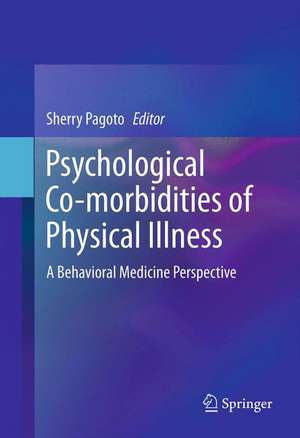Psychological Co-morbidities of Physical Illness: A Behavioral Medicine Perspective
Editat de Sherry Pagotoen Limba Engleză Hardback – 14 sep 2011
| Toate formatele și edițiile | Preț | Express |
|---|---|---|
| Paperback (1) | 999.08 lei 38-44 zile | |
| Springer – 31 aug 2014 | 999.08 lei 38-44 zile | |
| Hardback (1) | 1111.46 lei 6-8 săpt. | |
| Springer – 14 sep 2011 | 1111.46 lei 6-8 săpt. |
Preț: 1111.46 lei
Preț vechi: 1169.95 lei
-5% Nou
Puncte Express: 1667
Preț estimativ în valută:
212.71€ • 219.74$ • 177.02£
212.71€ • 219.74$ • 177.02£
Carte tipărită la comandă
Livrare economică 26 martie-09 aprilie
Preluare comenzi: 021 569.72.76
Specificații
ISBN-13: 9781441900302
ISBN-10: 1441900306
Pagini: 480
Ilustrații: XI, 466 p.
Dimensiuni: 155 x 235 x 33 mm
Greutate: 0.84 kg
Ediția:2011
Editura: Springer
Colecția Springer
Locul publicării:New York, NY, United States
ISBN-10: 1441900306
Pagini: 480
Ilustrații: XI, 466 p.
Dimensiuni: 155 x 235 x 33 mm
Greutate: 0.84 kg
Ediția:2011
Editura: Springer
Colecția Springer
Locul publicării:New York, NY, United States
Public țintă
ResearchCuprins
Obesity.- Diabetes.- HIV Infection.- Smoking.- Addictive Disorders.- Cardiovascular Disease.- Irritable Bowel Syndrome.- Cancer.- Asthma.- Autoimmune Disorders.- Developmental Disabilities.- Neurological Disorders.- Kidney Disease.- Pain (Headache, Rheumatologic, and Orthopedic Disorders).- Obstetrical and Gynecological Disorders.
Notă biografică
Dr. Sherry Pagoto is an assistant professor of medicine in the Division of Preventive and Behavioral Medicine in the University of Massachusetts Department of Medicine. She is a licensed clinical psychologist and a staff psychologist in the UMass Weight Center. Her clinical work in the Weight Center informs her program of research, which focuses on understanding and treating obesity in the presence of comorbid psychological disorders. She also is completing an NHLBI career development award on emotional eating, and has recently received three private foundation grants (Boston Obesity and Nutrition Research Center, Worcester Foundation of Biomedical Research, University of Massachusetts Clinical and Translational Science Pilot Project Program) to study behavioral and biological mechanisms of stress and depression on obesity and insulin resistance. She is also actively involved is skin cancer prevention research and is principal investigator of the Sunless Study, a randomized clinical trial sponsored by the National Cancer Institute. She was also the recipient of the Society of Behavioral Medicine’s Early Career/Young Investigator Award in 2006.
Textul de pe ultima copertă
The scenario is all too common, patients presenting with medical conditions who have co-occurring psychological disorders, and vice versa. Clinical challenges include poor treatment outcome, low adherence, and impaired quality of life. Yet as a common clinical phenomenon, these co-morbidities tend to be understudied by researchers and undertreated by practitioners. Psychological Co-Morbidities of Physical Illness is the first comprehensive reference addressing the topic from a behavioral medicine perspective and focusing on evidence-based practice. This accessible volume explains the physiological and behavioral mechanisms underlying co-morbid physical and psychological disorders, addresses treatment approaches and challenges with this population, and synthesizes findings across the disciplines. Each chapter focuses on a chronic medical condition and the most prevalent co-morbid psychological disorders for each, such as depression, anxiety, and psychotic disorders. For each condition, contributors review the treatment outcome literature and provide detailed information about effective psychological and pharmacological interventions, assessment instruments, treatment considerations (e.g., sequencing, contraindications), and, where relevant, cultural issues. Among the medical conditions covered:Obesity Type 2 diabetes Cardiovascular disease Tobacco dependence Chronic pain CancerDementia Chronic obstructive pulmonary disease Irritable bowel syndrome Multiple sclerosis Psychological Co-Morbidities of Physical Illness is an invaluable decision-making resource for practitioners and trainees working with co-morbid patients in clinical, public health, and academic settings, including psychologists and other mental health professionals, primary care and specialist physicians, nurses, and allied health care providers. Researchers and epidemiologists will find it a highly useful source of current data as well as a springboard for future research.
Caracteristici
First book to address psychological and medical co-morbidities from a behavioral medicine perspective
Information on assessment, treatment outcome, and treatment decision considerations relevant to clinicians and researchers
Emphasis on evidence-based behavioral practice
Includes supplementary material: sn.pub/extras
Information on assessment, treatment outcome, and treatment decision considerations relevant to clinicians and researchers
Emphasis on evidence-based behavioral practice
Includes supplementary material: sn.pub/extras








![Promoting Psychological Well-Being in Children with Acute and Chronic Illness: A Step-By-Step Resource [With CD (Audio)]](https://i2.books-express.ro/bt/9781843109679/promoting-psychological-well-being-in-children-with-acute-and-chronic-illness.jpg)

